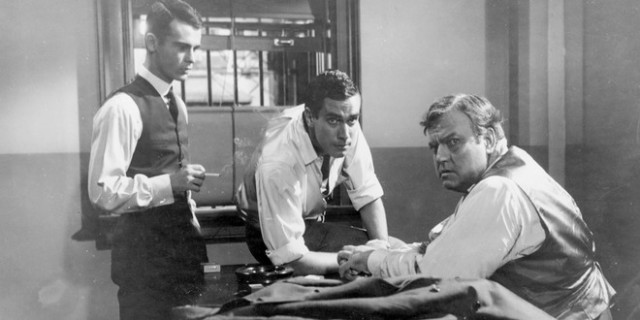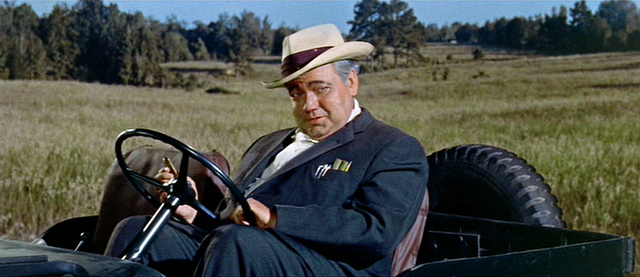THE LONG, HOT SUMMER (Martin Ritt, 1958) & COMPULSION (Richard Fleischer, 1959)
Film Forum
209 West Houston St.
Tuesday, January 20
Series continues through February 3
212-727-8110
www.filmforum.org
 Upon first look, it might seem that there is little in common between two of the movies Film Forum is screening together in its ambitious and exhaustive “Orson Welles 100” series other than the involvement of Mr. Welles himself. But it turns out that the double feature is somewhat of a genius pairing of two 1950s pictures that echo each other in more ways than one. In order to finance his career as a director (and pay off tax debts), Welles acted in numerous films, from the sublime (A Man for All Seasons, The Third Man, both of which are part of this month-long tribute to the centennial of his birth) to the ridiculous (Casino Royale, Butterfly, both of which are not). Between 1958 and 1961, he appeared in or narrated nearly a dozen and a half films; two of the best, Martin Ritt’s The Long, Hot Summer and Richard Fleischer’s Compulsion, are playing Film Forum on January 20. In both, the big, blustery Welles, his sweat practically dripping off the screen, takes center stage though primarily a supporting character. Welles claimed that he hated making The Long, Hot Summer, a fiery Tennessee Williams-like melodrama based on several works by William Faulkner, although clearly inspired by Cat on a Hot Tin Roof. Welles plays Will Varner, a wealthy plantation magnate who essentially owns a small southern town. He is grooming his son, Jody (Anthony Franciosa), to take over his empire, but when ambitious drifter and rumored barn burner Ben Quick (Paul Newman, who played Brick in Cat the same year) shows up looking for work, Will decides to set him against Jody, with the winner capturing the spoils, which in the case of Quick might also include Will’s young but already spinsterish daughter, Clara (Joanne Woodward, who married Newman during production). Shot in blazing CinemaScope, the film, which also stars Angela Lansbury as Will’s girlfriend, Lee Remick as Jody’s shopping-loving wife, and Richard Anderson as Clara’s momma’s boy beau, boils over with sexual energy that lives up to the original trailer’s declaration that “nothing — but nothing! — will be withheld!” The Long, Hot Summer earned no Oscar nominations and was not a box-office hit, but Newman became an international superstar by being named Best Actor at the Cannes Film Festival, while the film was in competition for the Palme d’Or.
Upon first look, it might seem that there is little in common between two of the movies Film Forum is screening together in its ambitious and exhaustive “Orson Welles 100” series other than the involvement of Mr. Welles himself. But it turns out that the double feature is somewhat of a genius pairing of two 1950s pictures that echo each other in more ways than one. In order to finance his career as a director (and pay off tax debts), Welles acted in numerous films, from the sublime (A Man for All Seasons, The Third Man, both of which are part of this month-long tribute to the centennial of his birth) to the ridiculous (Casino Royale, Butterfly, both of which are not). Between 1958 and 1961, he appeared in or narrated nearly a dozen and a half films; two of the best, Martin Ritt’s The Long, Hot Summer and Richard Fleischer’s Compulsion, are playing Film Forum on January 20. In both, the big, blustery Welles, his sweat practically dripping off the screen, takes center stage though primarily a supporting character. Welles claimed that he hated making The Long, Hot Summer, a fiery Tennessee Williams-like melodrama based on several works by William Faulkner, although clearly inspired by Cat on a Hot Tin Roof. Welles plays Will Varner, a wealthy plantation magnate who essentially owns a small southern town. He is grooming his son, Jody (Anthony Franciosa), to take over his empire, but when ambitious drifter and rumored barn burner Ben Quick (Paul Newman, who played Brick in Cat the same year) shows up looking for work, Will decides to set him against Jody, with the winner capturing the spoils, which in the case of Quick might also include Will’s young but already spinsterish daughter, Clara (Joanne Woodward, who married Newman during production). Shot in blazing CinemaScope, the film, which also stars Angela Lansbury as Will’s girlfriend, Lee Remick as Jody’s shopping-loving wife, and Richard Anderson as Clara’s momma’s boy beau, boils over with sexual energy that lives up to the original trailer’s declaration that “nothing — but nothing! — will be withheld!” The Long, Hot Summer earned no Oscar nominations and was not a box-office hit, but Newman became an international superstar by being named Best Actor at the Cannes Film Festival, while the film was in competition for the Palme d’Or.

Jonathan Wilk (Orson Welles) meets with clients Judd Steiner (Dean Stockwell) and Artie Strauss (Bradford Dillman) in COMPULSION
The next year, Welles and costars Dean Stockwell and Bradford Dillman shared the Best Actor award at Cannes for Compulsion, a searing exploration of crime and punishment in the guise of a teen exploitation flick. (Dig that crazy opening credit sequence!) Based on the novel and play by Meyer Levin that fictionalized the Leopold and Loeb case, Compulsion explores the nature of good and evil as it follows wealthy Chicago law school students Artie Strauss (Dillman) and Judd Steiner (Stockwell) on their mad rampage of murder and rape, determined to commit the perfect crime and get away with it because of their superior intellect. But when fellow student Sid Brooks (Martin Milner) finds a pair of glasses that might be the key to discovering who killed little Paulie Kessler, it’s going to take a lot more than understanding Friedrich Nietzsche to keep Artie and Judd from the hangman’s noose. Fleischer, who had a diverse career that ranged from Violent Saturday, The Vikings, Fantastic Voyage, and Doctor Dolittle to The Boston Strangler, Red Sonja, and Amityville 3-D, adds Hitchcockian flourishes to Compulsion, evoking the homoeroticism of Strangers on a Train and Rope (which was also a fictionalized retelling of the Leopold and Loeb story) while having most of the violence occur offscreen. (Fleischer’s cinematic use of the pair of glasses is also a direct reference to the glasses in Strangers on a Train, while Judd’s study of ornithology, highlighted by the stuffed birds in his bedroom, foresees Norman Bates’s taxidermy obsession in Psycho, made a year later.) Like The Long, Hot Summer, Compulsion boasts a strong — and familiar — supporting cast, including E. G. Marshall (The Bold Ones) as clever DA Harold Horn, Gavin MacLeod (The Love Boat) as one of his assistants, Diane Varsi (Peyton Place) as Sid’s girlfriend, Edward Binns (12 Angry Men) as a crack reporter, and Anderson (Oscar Goldman in The Six Million Dollar Man) as Judd’s older brother. But it is Welles’s presence that takes over the film in its later stages; playing larger-than-life defense attorney Jonathan Wilk, a character based on Clarence Darrow, he enters the film in a grand manner, as Fleischer opens up a space for him to come through a door and dwarf everyone else. Wilk’s eloquent closing argument about capital punishment is one that should be studied by lawyers, actors, directors, and death penalty proponents — even if Welles required the use of a teleprompter to get him through the powerful speech in a single take. Like The Long, Hot Summer, Compulsion received no Oscar nominations and was a box-office failure. Seen back-to-back, the two films work extremely well together, with smoldering story lines, expert cinematography (by Joseph LaShelle in the former, William C. Mellor in the latter), intense acting, and, yes, Orson Welles.
